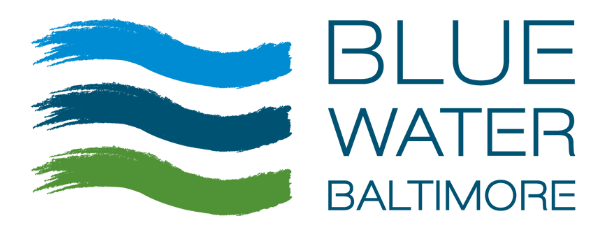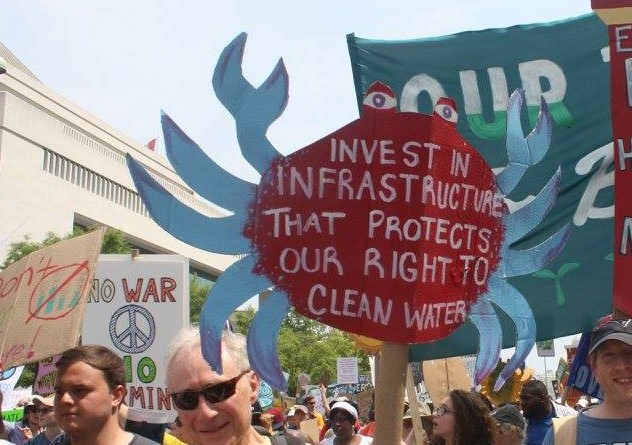Advocacy Update: Trees, Sewage Backups, Oh My!
The last few months at Blue Water Baltimore have been packed with important advocacy efforts in Baltimore City. We asked you to take action in support of the city’s trees and to speak out against sewage backups — and you did big time!
We have some exciting progress to share on these two issues. These wins would not have been possible without you taking action by contacting your councilmembers, submitting testimony, and spreading the word. Thank you for your efforts to build a greener and more equitable Baltimore!
Below are updates on our work to support residents dealing with sewage backups and to preserve our tree canopy:
Important Changes Coming to City’s Expedited Reimbursement Program for Sewage Backups
Sewage backs up into thousands of homes in Baltimore every year due to heavy rainfall coupled with the city’s crumbling infrastructure. These backups put residents’ health, homes, and financial security at risk.
In April 2018, Baltimore City launched a pilot Expedited Reimbursement Program to help residents cover the cost of cleaning up sewage backups in their homes. But two years in, there are serious problems with the program’s design and administration and most residents aren’t getting the help they need.
On July 28th, the Land Use Committee held their second hearing on this issue to determine how the City can better support people dealing with basement backups and fix our crumbling infrastructure. At that hearing, acting director of the Department of Public Works Matthew Garbark outlined the department’s plans to improve the city’s response to basement sewage backups. These proposed changes include the following:
- Eliminating the requirement that residents must report sewage backups to 311 within 24 hours. Untimely reports accounted for 34% of denials in the first year of the program so this change will allow more people to make use of the reimbursement funds.
- Increasing the maximum reimbursement from $2,500 to $5,000 per backup. Sewage backups can cost tens of thousands of dollars to address. $5,000 still isn’t enough, but it’s an improvement.
- Securing contracts to provide direct cleanup assistance for residents who experience backups so no one is forced to clean up raw sewage themselves. This is critical to protect public health and is in line with other jurisdictions’ approaches to helping residents safely manage sewage backups.
- Expanding the reimbursement program to apply to backups that occur in any weather conditions, not just wet weather. This will enable more people to qualify for the program since 43% of applicants in the first year were denied because DPW claimed the backup was not caused by rain — even though our analysis showed some of those backups did in fact occur during rainstorms.
While we are pleased with these proposed changes, we must hold DPW accountable to implement them. You can read more about the outcome of the hearing in our joint Op-Ed with Clean Water Action in the Baltimore Sun and stay tuned for opportunities to bring these changes to fruition.
Forest Conservation Bill Advances
This week, the Baltimore City Council advanced Council Bill 20-0546 Natural Resources – Forest and Tree Conservation to make important updates to forest conservation efforts in Baltimore. This bill is the first in a package of legislation to protect our urban tree canopy, and it will update the Code and the City’s manual in order to comply with state law, codify existing policies, and coordinate with other City environmental regulations. These updates will help curb future tree canopy loss due to development and build toward a greener, healthier city.
The Planning Commission unanimously approved the bill on July 9th, followed by the Judiciary Committee on August 4th. At the bill’s August 4th hearing, the Judiciary Committee added an amendment to the bill that would have exempted the Department of Recreation & Parks from following statewide afforestation guidelines when renovating existing athletic fields, courts, or playgrounds. The City Council voted to remove that amendment at their August 17th meeting, recognizing that Rec & Parks should be planting new trees as a matter of course, for every park project.
By advancing the bill as originally written, Baltimore City is one step closer to increasing equitable planting of trees in all Baltimore neighborhoods. The final vote on this bill will take place at the next council meeting on September 21st, and then it will go to Mayor Young’s desk.
During the City Council meeting last Monday, Councilwoman Mary Pat Clarke specifically spoke about how many letters the council had received in support of this bill. Thank you for taking action and stay tuned to help get this bill across the finish line!
Stay Engaged!
- Send the Mayor and City Council a message urging them to pass and sign the Forest Conservation Code update into law!
- Sign up for our email list to receive action alerts and information about our legislative priorities.
- Spread the word. Share Blue Water Baltimore’s action alerts with your friends, family, and neighbors. The more people who contact their elected officials about these issues, the more likely they are to succeed!

